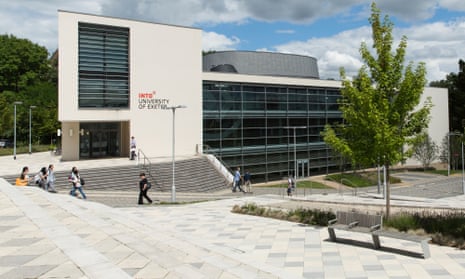A university has launched an investigation into one of its sports societies after students were pictured wearing T-shirts bearing antisemitic and racist slogans during a freshers’ week social event.
Photographs of the shirts were shared on Facebook and have caused outrage at the University of Exeter. One T-shirt included the phrases: “Don’t speak to me if you’re not white” and “The Holocaust was a good time”.
A student at the university, who asked not to be identified, posted images of the T-shirts on the social media site with the caption: “Making light of genocide and white privilege is not banter, you imbeciles.”
“They were all wearing theses white T-shirts with stuff written on them,” the student told +972 Magazine, a news and commentary blog that hosts posts from Israeli and Palestinian writers. “I asked if I could take the pictures and they didn’t seem to mind.”
The students wearing the T-shirts cannot be identified in the pictures, but it is believed the offensive tops were linked to the “white T-shirt social”, an event organised by the university’s snow sports society.
A spokesperson said: “The University of Exeter is an inclusive and friendly environment where all students are welcomed. Antisemitic, racist or bigoted behaviour in any form is not tolerated. An investigation was launched as soon as the university learned of this incident.”
Mark Kiner, the publicity director from the University of Exeter Jewish Society, said: “It is extremely concerning to see the use of such antisemitic language at the University of Exeter. Any language that glorifies the Holocaust is unacceptable and is not something that any student should have to experience during their time at university.
“If we could recommend a punishment for the students, I think it would be worthwhile for the university to bring in a Holocaust survivor and make it compulsory for those students to attend.”
He added: “Some individuals might think that it’s merely a joke and doesn’t mean much, but these were real events which happened to real people, and as such they should be respected. We urge the university to investigate and punish the students involved accordingly.”
Following the controversy, Exeter’s athletic union has banned any future sports socials involving the practice of students writing on white T-shirts. The Exeter athletic union president, Josh Callander, apologised and expressed his disappointment that “the unacceptable actions of a few individuals have overshadowed what has so far been a very successful freshers’ week”.
The University of Exeter snow sports society said that with only eight committee members it could “not be responsible for everything written by other students”. “Comments like these are not tolerated within our club,” the society said in a statement.
“We apologise if we offended anyone and we feel appropriate action was taken on the night to deal with these type of slogans if they were seen on anyone at our social. Snow sports has a zero tolerance policy for these actions and we will be contacting our members in due course to express this.”
The incident raises wider questions about antisemitic incidents in universities, which have gained attention after the president of the National Union of Students, Malia Bouattia, was accused of using antisemitic rhetoric this year.
According to a recent report by the Community Security Trust, the number of antisemitic incidents in the UK has risen by 11% in the first half of 2016.
